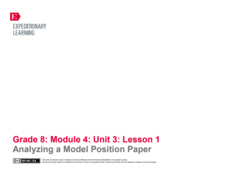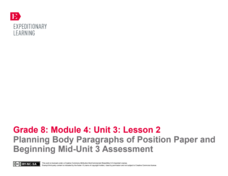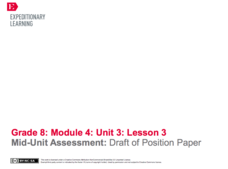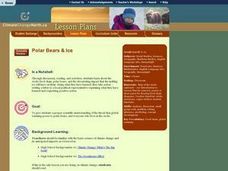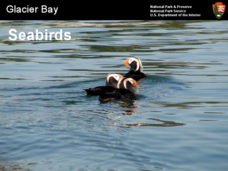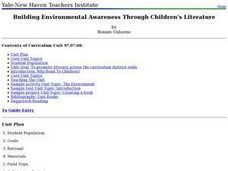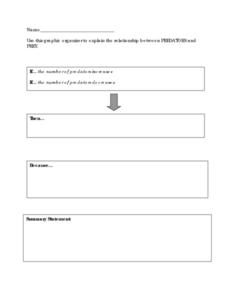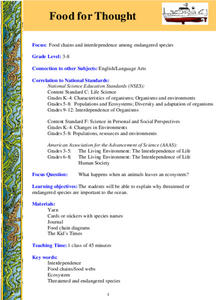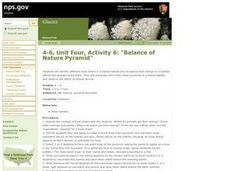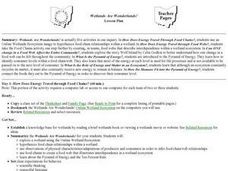EngageNY
Creating a Visual Component for the Speech: End of Unit Assessment Preparation and Practice
Eye contact, volume, pronunciation. Working with partners, scholars practice presenting their speeches about the best food chain. Additionally, they choose a visual component to support their end-of-unit speech.
EngageNY
Analyzing a Model Position Paper
What's the difference between a position speech and a position paper? Scholars use a rubric to analyze a model essay about Michael Pollan's food chains to understand what makes them unique. Additionally, pupils create anchor charts...
EngageNY
Planning Body Paragraphs of Position Paper and Beginning Mid-Unit 3 Assessment
The best sandwiches aren't always edible. Pupils use a Quote Sandwich graphic organizer to plan paragraphs two and three of their position papers about the best food chain. Next, they begin drafting their body paragraphs for the mid-unit...
EngageNY
Mid-Unit Assessment: Draft of Position Paper
What is the purpose of an introduction and conclusion? Using the resource, scholars review the model position paper from activity one and discuss the author's choices. Next, they draft their position papers' introductory and concluding...
EngageNY
End of Unit Assessment: Final Position Paper
All good essays must come to an end. Pupils write the final drafts of their position papers about the best food chain from Michael Pollan's The Omnivore's Dilemma. Next, they share their favorite part of their papers with their partners.
EngageNY
Introducing the Performance Task Prompt and Beginning a Visual Representation
What exactly is a visual representation? Scholars use a think-pair-share to answer questions and record their information on anchor charts. Next, they use what they've learned to create visual representations of their position papers on...
American Museum of Natural History
Pterosaurs: The Card Game
Piecing together the past is a challenging endeavor. Learners get a taste of that challenge as they play a game that incorporates several components such as trophic levels, geological time periods, and catastrophic events. Pairs work to...
Curated OER
Life or Death Food Chain Decision
Students discuss how energy is transferred to different trophic levels. In this biology lesson, students solve a theoretical problem and debate on a solution. They explain how energy is lost during cellular respiration.
Curated OER
EcoKids Web Site: Food Chain Game
Students use the EcoKids web site to explore food chains and the associated terminology. They answer the questions about food chains and their importance. Students use the Kidspiration program to add information to an Animal Fact Web.
Curated OER
Polar Bears and Ice
Students explore the Arctic food chain. They examine the needs of the polar bear and the threat that global warming poses to them. Students write a letter to a local political representative explaining what they have studied and...
Baylor College
Bio Build-up
Trace pollutants through the environment in the seventh lesson of this series on the science of food. Looking at a picture of the plants and animals in an aquatic ecosystem, learners use dot stickers to represent harmful chemicals as...
Curated OER
The Living Environment
In this living environment worksheet, students complete a crossword puzzle given 34 clues about the various species in the environment that produce, consume and decompose. Topics also include photosynthesis, respiration, glucose, organic...
Curated OER
Energy Flow Through Ecosystems
Middle or high school environmental studies classes will learn much from this presentation on energy in ecosystems. It covers the foundational topics of trophic levels, food webs, and nutrient cycles using informational text and...
Curated OER
Community Ecology
Chart ecological community interactions and answer questions about niche, defenses, trophic structure, and succession. This community ecology worksheet provides a general overview of the interactions that occur among organisms that share...
Curated OER
Glacier Bay Seabirds
A gorgeous collection of photographs take viewers on a virtual tour or Glacier Bay National Park with a focus on the seabirds living in the area. Adaptations to the polar climate are highlighted, different species of birds are displayed,...
Curated OER
Plankton in the Air
Here is a lab activity adequate for use with any full lesson on environmental factors that shape animal adaptations or marine animal characteristics. Pupils will discuss the role plankton plays in the environment and filter-feeding...
Curated OER
Environmental Awareness and Children's Literature
Use an alternative setting for pregnant teens and young mothers, as well as special education children to examine environmental topics through literature. Included in this unit is a visit to neighborhood libraries to select children's...
Curated OER
Mixed Up Chameleon
Students discover facts about chameleons. In this adaptations lesson plan, students read a book about chameleons and discuss the adaptations they have to survive. Students also discuss predator and prey of the chameleon. Students make...
Curated OER
Sunbeam Dining
Students learn at least two different things that animals eat, then construct a food chain and play a food chain game.
Curated OER
Predators and Prey
Students explain how the food chain works. They contrast predators with prey and describe their function in nature. Students discuss how the food chain aids in keeping nature balanced. In small groups, they play a game that simulates the...
Curated OER
Food for Thought
Learners understand the importance of each member of a food chain through a game. In this food chains lesson, students receive background information and then play a game to simulate what happens in the food chain of an endangered...
Curated OER
Food for Thought
Students explore the food chains in a variety of ecosystems and its relationship to the survival of threatened or endangered marine animals or fish in the ocean. The interdependence of the species is investigated in this lesson.
Curated OER
Balance of Nature Pyramid
Students study the concept of food chains and create a physical forest food chain pyramid. In this balance of nature pyramid instructional activity, students identify the ingredients needed on each level of the pyramid then make...
Curated OER
Wetlands Are Wonderlands!
Students explore the wetlands. They participate in numerous activities to explore food chains, food webs, and energy in the ecosystem. Students read stories, sing songs, visit specified websites, and participate in games to discover...
Other popular searches
- Desert Food Chain
- Animal Food Chain
- Deciduous Forest Food Chains
- Pond Food Chain
- Ocean Food Chain
- Frog Food Chain
- Food Chains in Biomes
- Arctic Food Chain
- Desert Animal Food Chain
- Ocean Animals Food Chain
- Coral Reef Food Chain
- Marine Science Food Chain



